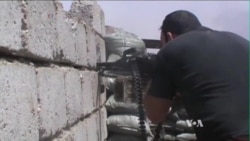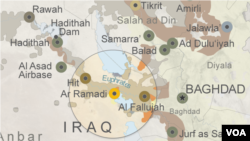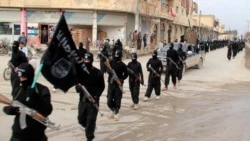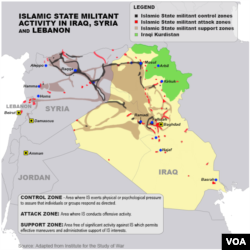Shi'ite Muslim militia and Iraqi government forces launched a counter-attack Saturday against Islamic State insurgents east of Ramadi, in their first attempt to retake the city since it fell to the extremist group one week ago.
The May 17 fall of Ramadi, the Anbar provincial capital, dealt a potentially devastating blow to Baghdad's central government.
The Sunni Muslim Islamic State extremist group now controls most of far-flung western Anbar province, which borders Syria, Jordan and Saudi Arabia. Analysts say the jihadists, if left unchecked, could threaten the western approaches to Baghdad.
Witnesses on Saturday told Reuters that Shi'ite fighters moved on three towns near Ramadi, one of them -- the IS-controlled town of Husaiba al-Sharqiya -- seven kilometers east of the provincial capital. There were also witness reports of gunfire, but no word on casualties.
US military
The U.S. military said the international coalition it leads conducted 22 strikes in Iraq overnight, focusing on Ramadi, the IS stronghold of Mosul, and the area near the oil refinery of Beiji.
Five coalition airstrikes also hit Syria, where a bomb destroyed anti-aircraft artillery systems in Palmyra – also known as Tadmur – where IS forces gained ground this week.
In other developments, the Saudi Interior Ministry released a statement Saturday confirming the identity of Saudi national Salih bin Abdulrahman as the Islamic State bomber who killed 21 Shi'ite worshippers at a mosque in eastern Saudi Arabia on Friday. Dozens more were wounded in the blast in the eastern governorate of Qatif.
IS militants on Friday claimed responsibility for the attack, identifying the bomber by his nom de guerre, Abu Ammar al-Najdi. The Saudi statement said the bomber was part of a cell controlled by IS militants from abroad, and said 26 other members -- all Saudi nationals -- had been arrested since last month.
The kingdom's top Sunni cleric, Grand Mufti Sheikh Abdulaziz Al al-Sheikh, told state television Saturday that the "totally criminal [bombing] plot aims to split our ranks and sow chaos in our country." But he said the nation and [Saudi] society are united under wise leadership" and will not be divided.
President reaffirms support
Earlier this week, U.S. President Barack Obama reaffirmed the U.S. government's support for Iraq Prime Minister Haider al-Abadi and the decision to plan an operation to retake control of Ramadi, which fell to IS last week.
RELATED VIDEO: Shi'ite militias battle Islamic State militants near Beiji
US strategy criticized
The fall of Ramadi is the most serious setback for Iraqi forces in almost a year and has cast doubt on the effectiveness of the U.S. strategy of airstrikes to help Baghdad roll back Islamic State, which controls about a third of Iraq.
In an interview published Thursday, Obama insisted the war against the jihadist group is not being lost.
"There’s no doubt there was a tactical setback, although Ramadi had been vulnerable for a very long time, primarily because these are not Iraqi security forces that we have trained or reinforced,” Obama said in an interview with news magazine The Atlantic.
Despite the loss of territory, however, the White House stood firm Friday, announcing no changes in its strategy against the militant group, which consists of thousands of U.S.-led coalition airstrikes to back Iraqi forces on the ground.
Iraq's Vice President Ayad Allawi on Friday sharply criticized the daily U.S.-led airstrikes against the Islamic State group, calling the campaign that began in August ineffective.
Colin Clarke, associate political scientist with the RAND Corporation, disagrees. He told VOA this week that the air raids have curtailed Islamic State oil profits – but the group is financially savvy. It diversified its income stream.
"When the oil revenues run low, the group simply switches to more reliance on looting state-owned banks in Iraq, and extortion and taxation in the areas under its control," Clarke said.
"Geographic expansion by IS fighters isn't only about extending boundaries to exert power – it means more people to tax," he added. Seizing Palmyra could also be lucrative if the group sells historic artifacts as it has in the past to fund its state-building aspirations.
Anbar provincial council member Azzal Obaid told Reuters hundreds of fighters, who arrived at the Habbaniya air base last week after Islamic State took Ramadi, were on Saturday in Khalidiya and approaching Siddiqiya and Madiq, towns in contested areas near Ramadi.
At the same time, the Islamic State group has been advancing toward Fallujah to try to absorb more territory in Anbar province that would bring them closer to the Iraqi capital Baghdad around 80 kilometers to the east.
Shi'ite paramilitary troops
Iraqi Prime Minister Abadi has sent Shi'ite paramilitary groups to try to retake Ramadi at the risk of inflaming tensions with the region's aggrieved, predominantly Sunni Muslim population.
On Friday, Islamic State insurgents claimed responsibility for two bombings in the Arabian peninsula targeting Shi'ite mosques.
A group describing itself as a newly-established affiliate of the Islamic State group – “Najd Province,” referring to the historic region of the central Arabian Peninsula home to the Saudi capital, Riyadh – said it was responsible for a blast in the eastern Saudi Arabian governorate of Qatif that killed 21 people and wounded at least 80 more.
A second bombing near a mosque in the Yemeni capital Sana'a wounded 13.
A statement on the Islamic State group's al-Bayan radio station, read aloud Friday night and posted Saturday morning to militant websites associated with the extremists, identified the suicide bomber as a Saudi citizen with the nom de guerre Abu Amer al-Najdi.
Some material for this report came from Reuters, AFP and AP.









